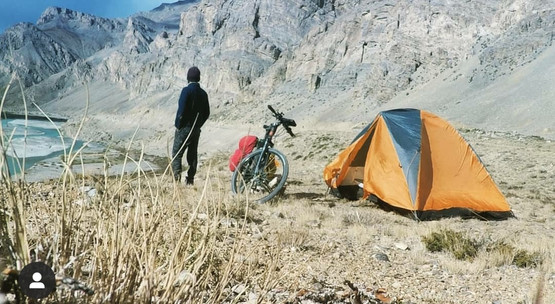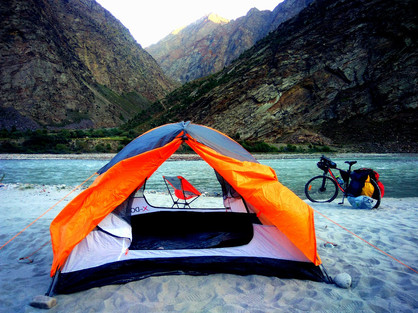Cycling across rural India for 5 years, making self-sustainable farms a reality!
- Ishita S
- Jan 24, 2022
- 4 min read
Updated: Sep 6, 2022
Ankit Arora, a former journalist, has been on a cycling journey across rural India. He left a flourishing career in journalism to start exploring the depths of India and its rich culture and tradition.
He wanted to discover India’s real culture not published in any books or blogs, and wanted to experience a slice of life of an average rural Indian. Along the way he discovered and furthered his love for creating self-sustainable communities in small villages and tribal areas.
Ankit’s photographs are giving us a vicarious experience. Here are some of them for you to dive-in.
Making a self sustainable farm, mud houses and dry toilets:
In the quiet, lush green views in Krishnagiri, Tamil Nadu, Ankit built a self-sustaining village called Innisfree farm. It’s a beautiful community where one can practice all sorts of arts, crafts, organic farming and build natural mud houses. It’s a self-sustaining village in the heart of nature.
He started organic farming and started building mud-houses, using organic materials like locally available red mud and brown mud, jaggery, honey, egg yolk, using an ancient tribal technique of house building. The homes enable cost-efficient thermal insulation, natural malleability while reducing their carbon footprint. He learnt all of this during his journey and experiences with tribals and his quest to find the ancient wisdom of the country.
One of his unique projects is this large mud sofa.
Wondering how all this was made out of mud?
Plastic waste recycle techniques were used in building mud house and sofas. Bottle bricks were designed using plastic bottles stuffed with packet wrappers, which resembled traditional bricks. Alcohol bottles collected from nearby rivers and Hogenakkal waterfalls were used in the construction. Natural termite repellents were created by combining water with holistic herbs like neem leaves, kadukai seeds, green chillies, garlic, turmeric and lime. In the farm, they now have two mud houses, two wooden and thatched houses, two dry toilets, one mud sofa, two mega size ponds for rainwater harvesting. They are also using wooden, coconut and mud vessels in their kitchen which Ankit has made from waste wood and waste coconut shells. They are also practicing various arts and crafts with waste wood and coconut which includes wooden chopping boards, coconut shell bowls, artistic face masks and earrings and that are also attracting the local villagers and ladies who are now interested to take part in such activities. They are also growing their own vegetables like spinach, tomatoes, green chilli, okra, bitter gourd and many fruit trees like mango, tamarind, jackfruit and are totally self-dependent for our vegetables and fruit supply.
Innisfree Farms: 100% self-sustainable and empowering local communities.
Today, Innisfree farm reuses 100% of their waste to power eco-toilets, kitchens, electricity and even fodder for the local animals. The farm is a beacon of the local community, providing employment as well as education to surrounding farmers. In the natural farm in Krishnagiri, we also train and teach people traditional art forms like Madhubani, Gond, Pichwai, and wall painting. Ankit helps in making organic soaps and kitchen compost. Ankit also learnt how to make kokedama, the Japanese art of growing a plant. We are also making wooden cutlery, kitchen items and furniture from the waste coconut shells and waste wood from the villages. The villagers and youngsters are very keen to learn these practices.
Innisfree farms is aiming to spread the social message of environment protection and climate change; promoting the use of renewable energy and managing waste effectively.
How did Ankit start his journey?
While pedaling across rural India, Ankit started engaging in all the activities starting from working with farmers to make wooden sculptures in Maharashtra and Bangalore, weaving Khadi shirts, making mud houses for villagers of a remote hamlet in Anantapur district, Nagpur and Tamil Nadu, making coconut shell cutlery and jewellery, learning natural farming and forest conversation from the tribals, learning Thanjavur art, Madhubani art, Tribal gond art to learning the 400-year-old wooden toy making art in Etikoppaka, learning the rural arts — Kondapalli in Andhra Pradesh to making the musical instrument Veenas in Nuzividu; Ankit’s journey has connected me with people in more ways than one.
His purpose now is to connect with communities and share the learnings he has received from farmers, tribals, weavers, potters, artists, sculptors, musicians, labourers, students, and urban families; with others like them.
He has also won a Guiness Book of World Records for the longest journey on a bicycle within a single country.
Ankit’s ongoing quest
Ankit’s love for India and to understand who/what she is has taken him on an unending quest. He will continue his journey and not stop until he has covered the rest of India. Cheers to Ankit and inspiring journeymen like him who undertake such wonderful initiatives..
Show some love on his wanderlust-inspiring feed.
Facebook: https://www.facebook.com/indiaonmycycle/
Instagram: https://www.instagram.com/india_on_my_cycle
We’re also saddened to share that Ankit is currently going through some serious health concerns and has paused updates on his social media. Here’s how you can help this cyclist come back to normalcy as his savings are exhausted travelling through the country and supporting rural communities. No amount is too small.
If you haven’t read our previous blog on Ankit Arora- here’s the in-depth interview from when he had just started his journey.








































Comments